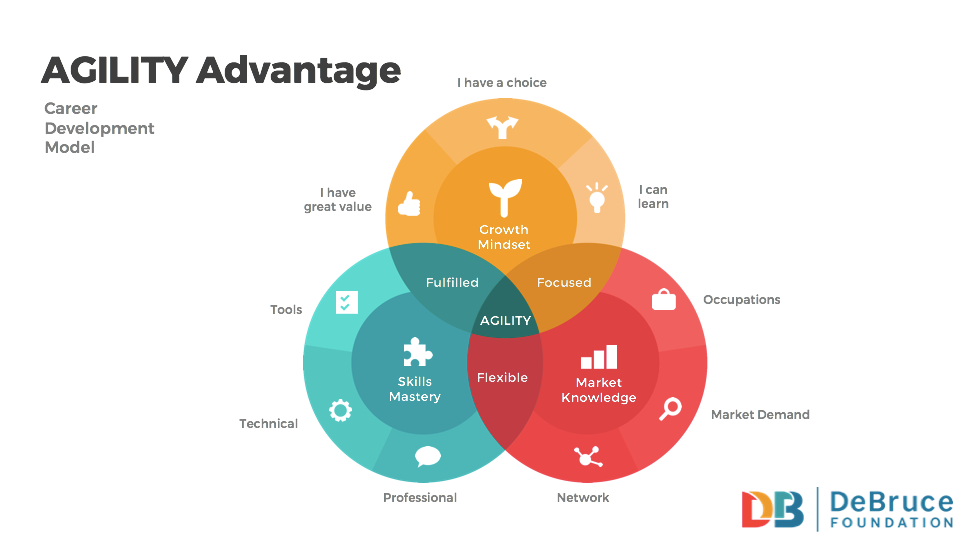Link copied to clipboard
The DeBruce Foundation is expanding pathways to economic growth and opportunity. One way to accomplish this goal is to help individuals develop Agility Advantage. People with Agility Advantage are poised to strategically enter the career marketplace and adroitly address work changes regardless of sector, economic forces, training, or experience required. Put another way, Agility Advantage prepares individuals to overcome challenges and navigate the almost certain upcoming changes in workplace technologies, job restructuring, and the demise of traditional employment sectors.
Agility Advantage is the career advantage gained by growing three interrelated and combined processes: (a) a growth mindset (ability to believe you have value, can learn, and take action); (b) skills mastery (acquisition of professional and technical skills including digital tools); and (c) market knowledge (understanding market demand including access to a robust relational network). Based on evidence and grounded in research, The DeBruce Foundation uniquely integrated these three critical workplace success factors to create Agility Advantage. The diagram below describes the inner workings of DeBruce’s Agility Advantage concept.

By pinpointing these key elements, it is easier to identify and explore the types of exposure, education, and experiences beneficial to growing Agility Advantage. The outer rings in the diagram below provide additional detail on what comprises the three aspects of Agility Advantage.

Growth Mindset is the belief that your basic qualities are things you can cultivate through your efforts, your strategies, and help from others. This outlook, based on the importance of underlying beliefs about learning and intelligence, is credited to the psychologist, Carol Dweck. She explains three beliefs of a growth mindset that are central to DeBruce’s Agility Advantage:
- I have a choice. Dweck states, “Mindsets are just beliefs. They’re powerful beliefs, but they’re just something in your mind” (Dweck, 2013, p. 16). People can choose to change their mind.
- I can learn. Dweck (2013) notes that while people are born with a desire and ability to learn, this capacity is often stifled over time. Anyone can learn.
- I have great value. Dweck says, “Although people may differ in every which way—in their initial talents and aptitudes, interests, or temperaments—everyone can change and grow through application and experience” (Dweck, 2013, p. 7). This change and growth increase a person’s value.
Skills Mastery is the development of different types of capabilities and knowledge. To have Agility Advantage, it is important for a person to be growing skills including:
- Tools. Proficiency with modern technology and digital tools.
- Technical Skills. Sometimes called hard skills, this type of expertise is often needed to complete specific tasks or jobs and is frequently taught through classroom education, apprenticeships, or other formal training. This is where the Agile Work Profiler© will come in handy to find out your strengths and interests related to work activities found in every job in the economy.
- Professional Skills. Sometimes called soft skills, life skills, durable skills, or transferable skills, these abilities are harder to assess via standard credentials but vital to career success. Key abilities in this area include adaptability, communication, critical thinking, collaboration, creativity, empathy, leadership, problem-solving, and time management.
Market Knowledge is exposure, understanding, and connection to the world of work. Both entrepreneurs and employees benefit from information about, and connection to, the marketplace. Of particular interest for Agility Advantage is knowledge related to:
- Occupations. When people understand career pathways, opportunities, and requirements, they can make better career choices. It is difficult to aspire to something with which you are not familiar.
- Market Demand. Information on industry needs, trends, and outlook can help people anticipate opportunity and position themselves to be ready to meet or create opportunity.
- Network. Social networks, including strong and loose ties to the marketplace, bring important benefits, information, introductions, resources, and recommendations.
References
Dweck, Carol S. (2013). Mindset: The new psychology of success:
how we can learn to fulfill our potential: parenting, business, school,
relationships (Ballantine Books, 2016).